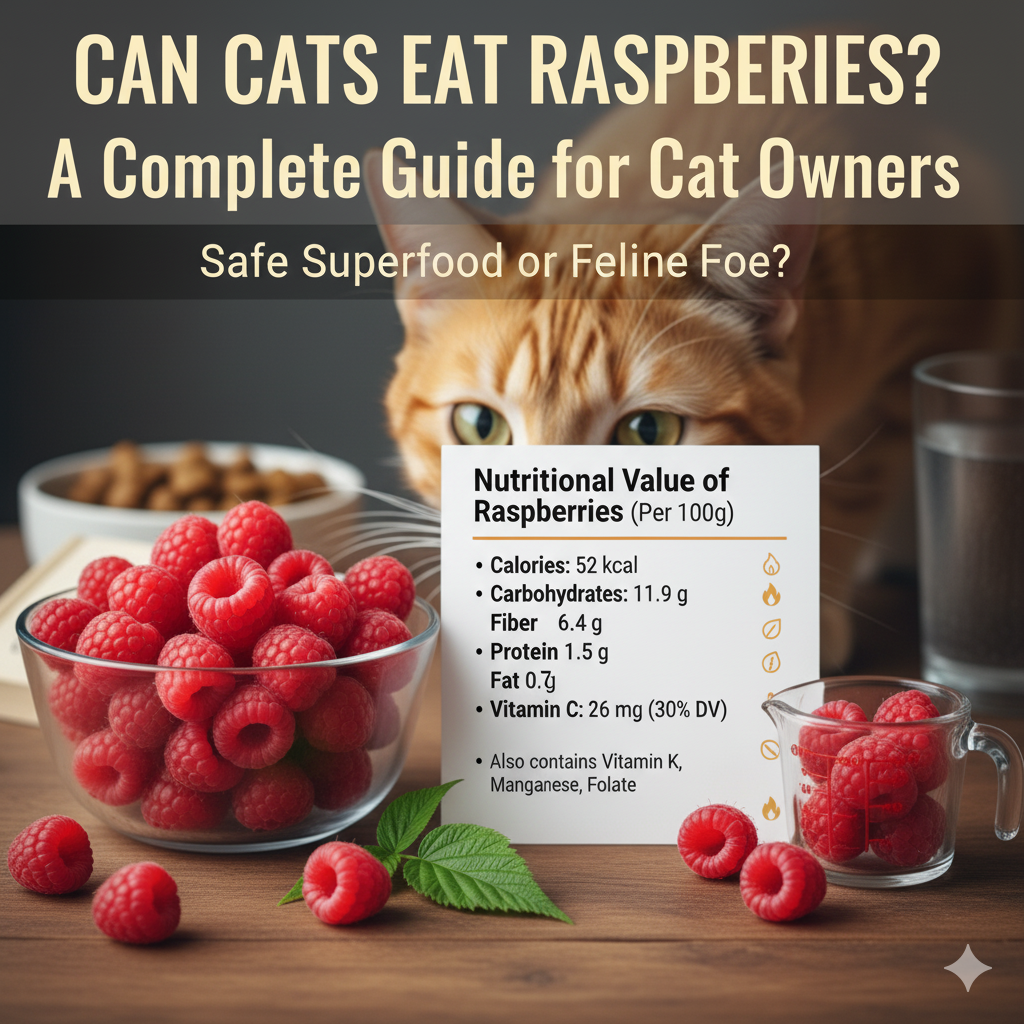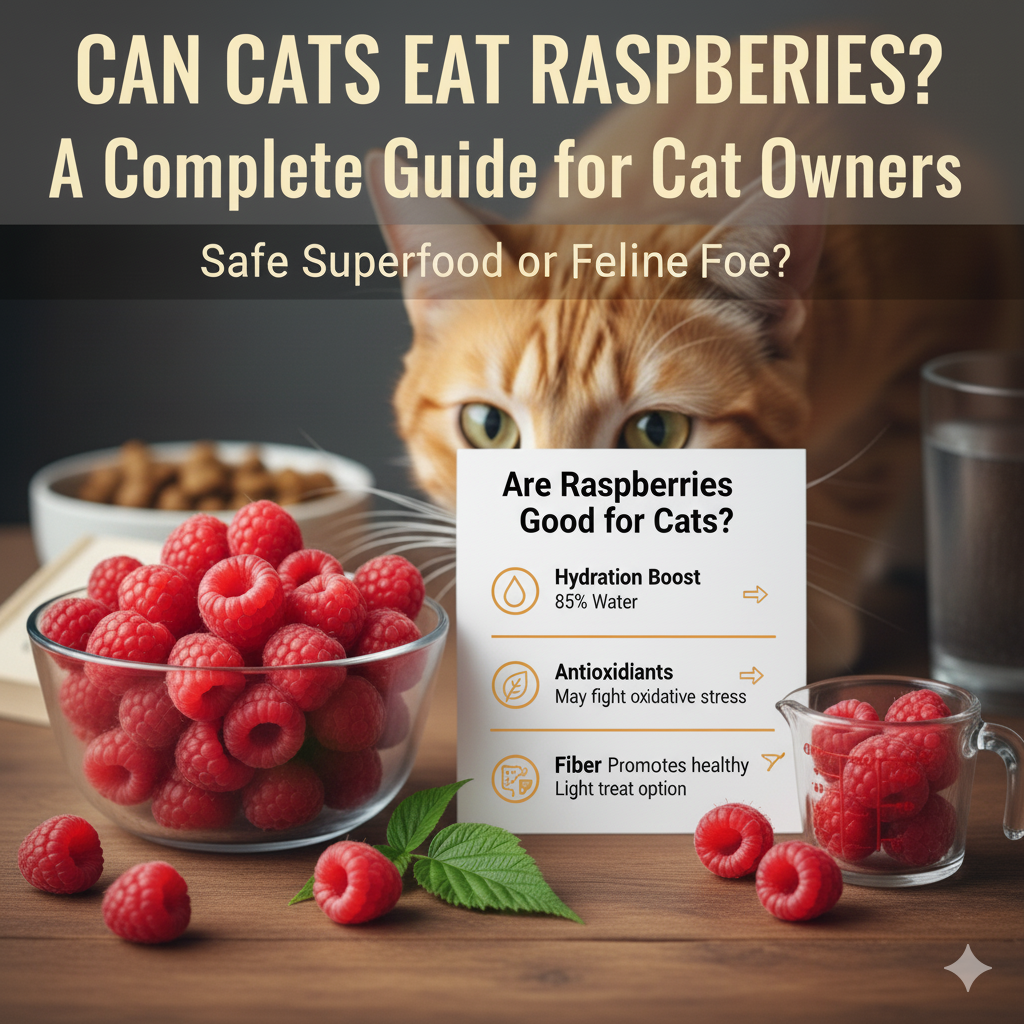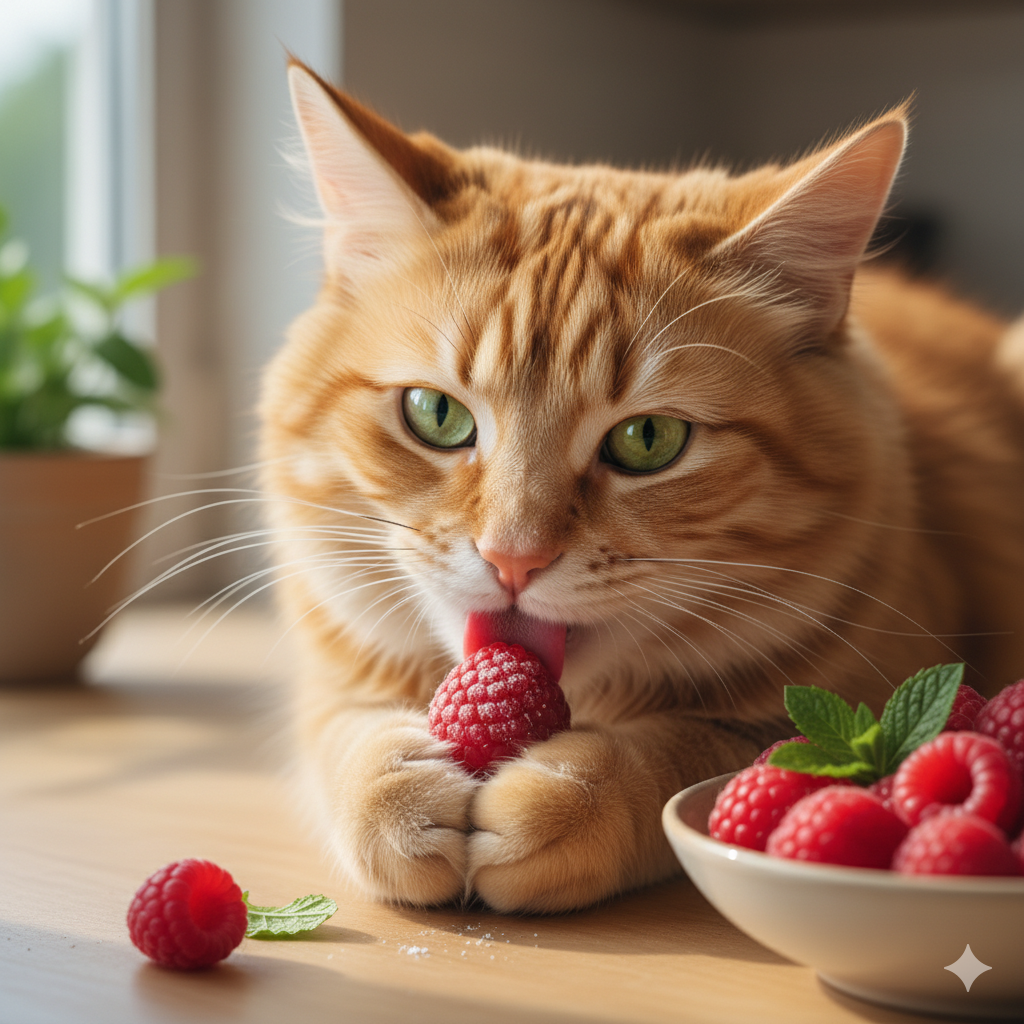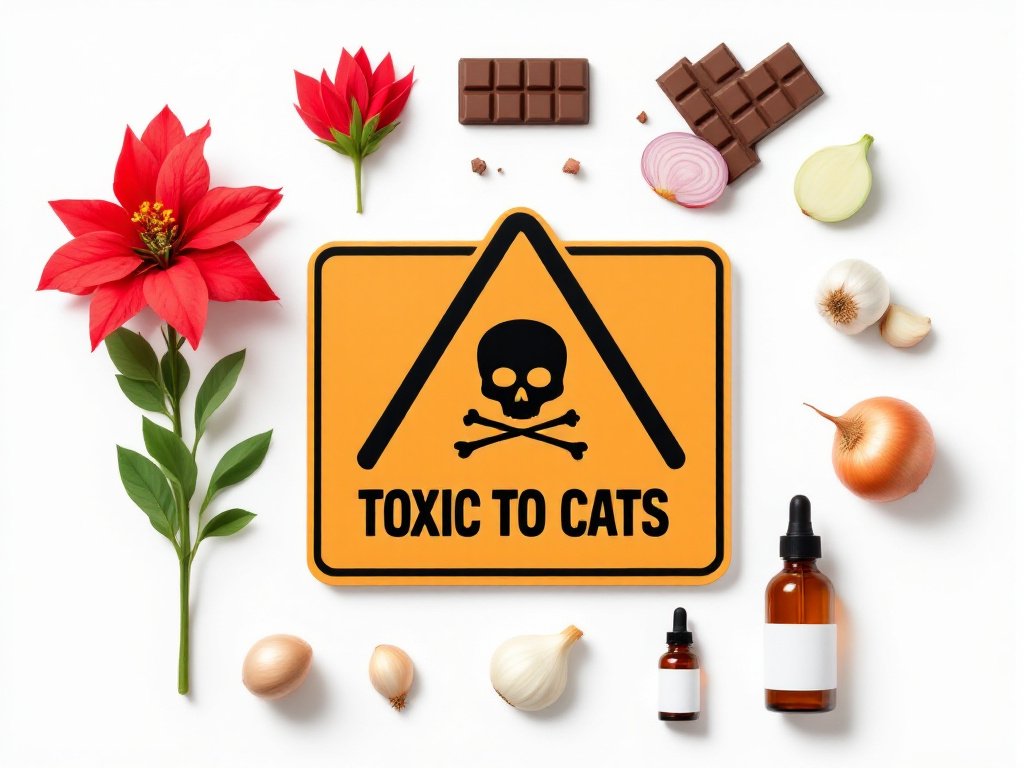Post Disclaimer
Catopedea shares information for educational and general interest purposes only. Our content is not a substitute for professional veterinary advice, diagnosis, or treatment. Always consult a licensed veterinarian for concerns about your cat’s health, diet, or behavior.
Cats are curious by nature, often sniffing around anything their humans are eating. If you’ve ever enjoyed a handful of raspberries only to find your cat watching closely, you may have wondered: Can cats eat raspberries safely?

The good news is yes-cats can eat fresh raspberries in small amounts. They’re not toxic and may even provide minor benefits. However, that doesn’t mean raspberries should be a regular part of your cat’s diet. Cats are obligate carnivores, meaning they thrive on meat, not fruit.
In this detailed guide, we’ll explore everything you need to know about cats and raspberries-nutritional facts, benefits, risks, safe serving sizes, and expert-backed recommendations.
Are Raspberries Safe for Cats?
Fresh raspberries are safe for cats in small amounts. Unlike toxic fruits such as grapes or citrus, raspberries do not pose a poisoning risk to felines.
- They contain fiber, antioxidants, and vitamins.
- They’re low in calories compared to many other fruits.
- Cats can digest them in small quantities, but too many may upset their stomach.
👉 According to PetMD, fruits like blueberries, bananas, and raspberries can be offered occasionally, but never as a diet staple.
Nutritional Value of Raspberries

To better understand their impact, let’s break down raspberries nutritionally.
Per 100g (about 1 cup of raspberries):
- Calories: 52 kcal
- Carbohydrates: 11.9 g
- Sugars: 4.4 g
- Fiber: 6.5 g
- Protein: 1.5 g
- Fat: 0.7 g
- Vitamin C: 26 mg (30% DV for humans)
- Vitamin K, manganese, and small amounts of folate
(Source: USDA SNAP-Ed Seasonal Produce Guide – Raspberries)
A single raspberry weighs about 3-4 grams, meaning it only has 1-2 calories. For a cat weighing 10 pounds, whose daily caloric intake is around 200-220 calories, even a couple of raspberries add negligible calories.
Are Raspberries Good for Cats?

Raspberries can provide some minor benefits to cats, though they are not essential:
- Hydration boost – raspberries are about 85% water.
- Antioxidants – may help fight oxidative stress.
- Fiber – can promote healthy digestion in tiny amounts.
- Low calorie – makes them a “light” treat compared to cheese or meat snacks.
But here’s the catch: cats don’t need these plant-based nutrients. They require taurine, animal protein, and fat from meat sources. A cat could live its entire life happily without fruit.
Are Raspberries Toxic to Cats?

No, fresh raspberries are not toxic to cats. However, caution is needed with processed forms:
- Raspberry jam, jelly, or syrup – contain high sugar and sometimes xylitol, an artificial sweetener that is extremely toxic to dogs (less so to cats, but still unsafe). ASPCA warns against feeding pets anything with artificial sweeteners.
- Flavored yogurts or desserts – may contain dairy, sugar, and additives harmful to cats.
- Raspberry ketone supplements – marketed for weight loss in humans, but unsafe for pets.
👉 Always stick to plain, fresh raspberries only.
Should Cats Eat Raspberries?
While raspberries aren’t toxic, that doesn’t mean cats should eat them often. Veterinarians typically follow the “10% rule”: treats should make up no more than 10% of your cat’s daily calories (VCA Hospitals).
That means:
- 1-2 raspberries once in a while is fine.
- Feeding them daily is unnecessary and may cause digestive upset.
Risks of Feeding Raspberries to Cats
Before you hand your cat a berry, be aware of potential risks:
- Digestive upset – too much fiber may cause diarrhea or vomiting.
- Excess sugar – cats don’t metabolize sugar well, raising risks of obesity or diabetes.
- Choking hazard – whole raspberries are soft, but smaller cats may still gag.
- Artificial additives – anything flavored, sweetened, or preserved should be avoided.
If your cat experiences vomiting, lethargy, or diarrhea after eating raspberries, stop immediately and consult a vet.
How to Safely Offer Raspberries to Cats
If you want to let your cat taste raspberries, follow these steps:
- Wash thoroughly – remove pesticides and dirt.
- Cut or mash – smaller pieces reduce choking risk.
- Limit serving – no more than 1-2 berries per week.
- Supervise – don’t leave your cat alone with food they’re not used to.
- Avoid stems and leaves – these can be rough on digestion.
Pro tip: Mash a small piece into your cat’s wet food if they’re curious.
Fun Ways to Share Raspberries With Cats
While cats may not crave fruit, some owners like to share snacks in creative ways:
- Raspberry “popsicle” – freeze one or two raspberries in an ice cube with water. It’s a fun enrichment activity.
- Mix with treats – mash a bit of raspberry into a meat-based cat treat.
- Interactive play – some cats enjoy pawing at a raspberry like a toy before tasting it.
This is where the playful concept of a “raspberry cat” comes in-cats fascinated by the fruit more as a toy than a snack.
Can Kittens Eat Raspberries?
It’s best to avoid giving raspberries to kittens. Young cats have more sensitive digestive systems and need a strict diet of kitten-formulated food. Adding fruits too early may upset their stomachs or interfere with growth.
What Fruits Are Safe for Cats?
If you’re looking for alternatives, several fruits are generally safe in small amounts:
- Blueberries
- Strawberries
- Banana slices
- Watermelon (seedless)
- Cantaloupe
👉 Check: Can Cats Eat Cinnamon Toast Crunch?
Fruits to avoid completely include grapes, raisins, citrus fruits, cherries, and avocado.
Expert Opinions on Cats and Fruit
Veterinary nutritionists emphasize that cats do not need fruit at all. According to Cornell Feline Health Center, cats are obligate carnivores, relying on nutrients like taurine and arachidonic acid found only in meat.
While a raspberry now and then is harmless, it’s not beneficial or required. Your cat’s health will be best supported by a balanced commercial diet that meets AAFCO standards (AAFCO – Reading Labels).
FAQs About Cats and Raspberries
Are raspberries toxic to cats?
No, fresh raspberries are safe in moderation. Processed ones with sugar or xylitol should be avoided.
How many raspberries can cats eat?
Just 1-2 berries occasionally.
Can kittens eat raspberries?
No, stick to kitten food until they’re older.
Do cats like raspberries?
Some cats are curious, but they cannot taste sweetness, so enjoyment is more about smell and texture.
What are better treats than raspberries?
Cooked plain chicken, freeze-dried meat treats, or commercial cat snacks.
Conclusion
So, can cats eat raspberries? Yes-but only in moderation. Fresh raspberries are non-toxic and can be offered as an occasional treat. They may provide hydration, fiber, and antioxidants, but they are not necessary for feline health.
The key is balance. Cats thrive on a meat-based diet, and fruits like raspberries should never replace proper nutrition. A couple of berries once in a while is fine, but their main diet should come from high-quality cat food.
👉 Curious about more safety guides? Explore our article: Safe Essential Oils for Cats


